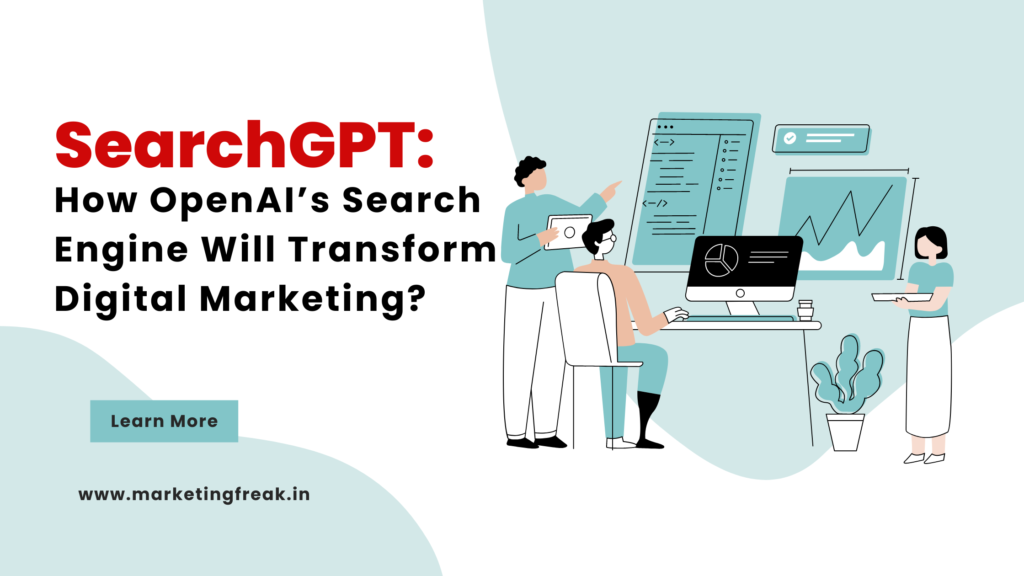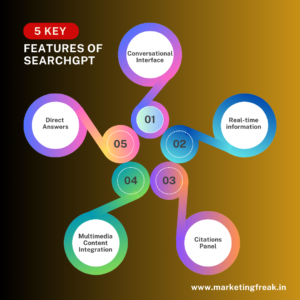As the digital landscape evolves, staying ahead of the curve has never been more challenging—or exciting.
Every day, Google updates its algorithms, AI gets smarter, and new tools emerge, changing how we interact with information.
For marketers, this constant flux brings both opportunity and uncertainty.
One of the most discussed developments is OpenAI’s SearchGPT, an AI-powered search engine that many believe could challenge Google’s dominance.

While Google still dominates the search engine market, OpenAI’s SearchGPT introduces a fresh, conversational search approach that promises to reshape how we think about search engines and digital marketing.
In this article, we’ll delve into the essential features of SearchGPT, explore its impact on digital marketing strategies, and discuss the benefits of adopting this cutting-edge technology.
What is SearchGPT?
SearchGPT is an AI-powered search engine developed by OpenAI. SearchGPT combines the strengths of traditional search engines with the conversational abilities of large language models. It provides answers to user queries using real-time information from across the web. Its conversational interface allows users to interact in a more natural way, asking follow-up questions and diving deeper into topics.
Unlike traditional search engines that primarily rely on keyword matching and provide a list of blue links for users to sift through, SearchGPT engaging in a dialogue-like experience and delivers contextually rich responses based on understanding user intent.
Although OpenAI hasn’t detailed its inner workings, the underlying technology likely involves retrieval-augmented generation (RAG). This method enhances response accuracy by integrating trusted data sources into the LLM’s output. It can provide not only relevant answers but also linking back to original content through a citation panel, ensuring transparency.
This means users can ask questions in natural language and receive tailored responses, making the search experience more intuitive and effective. It reduces inaccuracies and enriches the context of the answers provided.
Key Features of OpenAI’s SearchGPT

- Conversational Interface: SearchGPT allows for more natural, dialogue-like interactions, making the search experience feel more personal.
- Real-time information: SearchGPT pulls live data from trusted sources, ensuring responses are timely and accurate.
- Citations Panel: SearchGPT offers a citations panel, allowing users to verify sources and explore topics further promoting transparency and reliability.
- Multimedia Content Integration: Users can benefit from diverse content formats, including text, images, and videos, making it easier to absorb information.
- Direct Answers: Instead of sifting through multiple links, SearchGPT provides direct answers to queries, significantly enhancing user satisfaction.
How Does SearchGPT Compare to Google?
While my initial impressions of SearchGPT are positive, it’s essential to note that Google’s AI Overviews (AIO) still dominate in traditional search. However, SearchGPT focuses on enhancing the search experience through conversational AI, which not only improves user satisfaction but also encourages deeper exploration of topics.
SearchGPT may reduce clicks for informational terms, but it opens new avenues for connecting with customers beyond Google’s search results.
Two main distinctions stand out for digital marketers:
- Citations: SearchGPT provides clearer references compared to Google’s icon-based system.
- Conversational Search: SearchGPT fosters deeper interactions, allowing users to ask follow-up questions.
This conversational nature invites marketers to create content strategies that cater to a broader range of queries, encouraging deeper user exploration.
Benefits of AI-Powered Search Engines
The benefits of adopting AI-powered search engines like SearchGPT are manifold:
- Improved User Experience: Enhanced interaction leads to higher satisfaction rates.
- Time Efficiency: Users receive direct answers quickly, reducing the time spent on searches.
- Increased Brand Visibility: As users engage more deeply with content, brands can gain greater visibility.
SearchGPT: How OpenAI’s Search Engine Will Transform Digital Marketing
The introduction of AI-powered search engines like SearchGPT requires marketers to rethink existing strategies. Here are several ways SearchGPT will change the digital marketing landscape:
1. Search is Becoming More Conversational
As SearchGPT shifts towards more conversational search experiences, the days of focusing solely on keywords are fading. Its advanced natural language processing (NLP) allows for more meaningful interactions by understanding the intent and context behind user queries. This shift means marketers must go beyond traditional keyword research and start thinking about broader topics and questions users are likely to explore.
In this new landscape, content creation should align with the natural flow of conversation. Rather than trying to stuff content with specific keywords, marketers should focus on answering user questions in a comprehensive and engaging way. Understand the common questions your audience might ask and provide thoughtful, detailed answers that anticipate follow-up inquiries. The rise of conversational AI opens up new opportunities for highly targeted content designed to resonate with users on a deeper level.
2. Leverage Rich Media in Your Content Strategy
As search becomes more dynamic, the role of multimedia content will grow even more vital. SearchGPT can reference and understand various media formats beyond text, such as videos, infographics, and interactive elements. Incorporating rich media into your content strategy will not only make it more engaging but also enhance your chances of being recognized by AI-powered search engines.
Although AI can now better understand images and video context, it’s still crucial to ensure your media is well-optimized and enriched with relevant metadata and descriptions. Properly labeled and described media will not only make your content accessible to AI but also to users thereby improving overall visibility and performance.
3. Earned Media Remains Crucial
SearchGPT prioritizes high-authority sources when generating its responses, which makes earned media even more important for marketers. Unlike traditional search engines, SearchGPT tends to link out to authoritative publications more frequently.
As OpenAI forms partnerships with top content creators and publishers, being featured in high-authority websites could boost your brand’s inclusion in AI-generated responses. The more credible your brand, the more likely it will be referenced in SearchGPT’s results, driving both awareness and traffic.
Key takeaway: Strengthen your digital PR strategies, thought leadership, and building relationships. Aim to get your brand mentioned in high-authority publications to increase visibility in AI-generated content.
4. High-Quality Content is Still Key
Despite advances in AI, producing high-quality content remains the foundation of SEO success. SearchGPT prioritizes accurate, relevant, and up-to-date information. This means that brands who consistently produce high-quality content will see more traffic, greater engagement and increase their chances of being referenced by AI-powered search engines. More importantly, quality content that answers user intent thoroughly will not only keep you visible in search results but also encourage users to stay longer on your pages.
Regular updates and fact-checking ensure that content remains relevant and aligned with user intent. In an AI-driven world, your content’s quality will determine whether it’s referenced, shared, and appreciated by both users and algorithms.
Staying ahead means focusing on producing accurate and well-researched content that truly adds value. So, whether you’re optimizing existing content or creating something new, focus on delivering value.
5. Adapting Analytics and Tracking New Metrics
As SearchGPT reshapes how users interact with search engines, traditional metrics like click-through rates (CTR) and page rankings may not tell the full story anymore. Instead, digital marketers must shift their focus to tracking new metrics that reflect how well their content performs within AI-driven search environments.
New KPI’s may include user engagement, brand visibility in AI responses, and the overall impact of AI on your digital presence. You’ll need to monitor mentions in conversational search results and measure the accuracy of AI answers citing your content. These insights will provide more valuable feedback on how users engage with content in an interactive search environment.
These five key implications underline how SearchGPT will change the way digital marketers approach. By focusing on conversational engagement, rich media, earned authority, high-quality content, and adaptive metrics, marketers can stay ahead in an AI-dominated search landscape.
The Future of Digital Marketing: More Personalized, More Conversational
As SearchGPT continues to develop, it’s clear that the future of digital marketing is becoming more personalized and interactive. OpenAI’s SearchGPT represents a significant evolution in AI-powered search. It will fundamentally change how users find information, and how brands connect with those users. Marketers who embrace these changes will find themselves well ahead of the competition.
While Google may still hold the crown in search, OpenAI’s SearchGPT is pushing the boundaries of what search engines can do. This shift presents an incredible opportunity for marketers to develop forward-thinking strategies. This will not only optimize for AI but also engage users on a more meaningful level.
Ultimately, success in this new era of search will require a blend of high-quality content, multimedia strategies, and a commitment to staying ahead of the evolving digital landscape.
In summary, staying ahead in the world of digital marketing means understanding and leveraging innovative tools like SearchGPT. By focusing on user intent, conversational engagement, and high-quality content, marketers can leverage this technology. Using this will enhance their marketing strategies and connect more effectively with their audience. Embracing the changes brought about by AI-powered search will not only improve the search experience but also provide significant competitive advantages in the digital marketplace.
Are you ready to transform your marketing game and leverage the power of SearchGPT?





One thought on “SearchGPT: How OpenAI’s Search Engine Will Transform Digital Marketing”